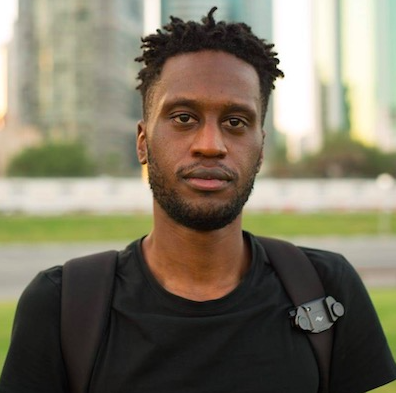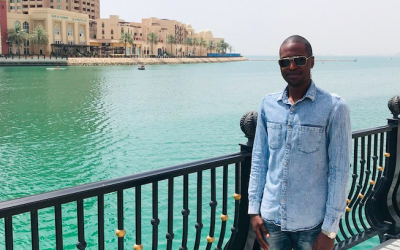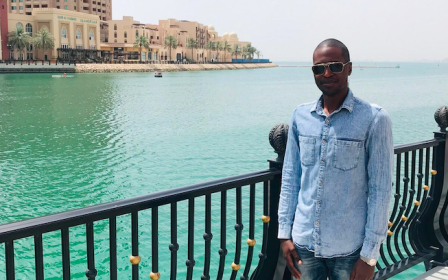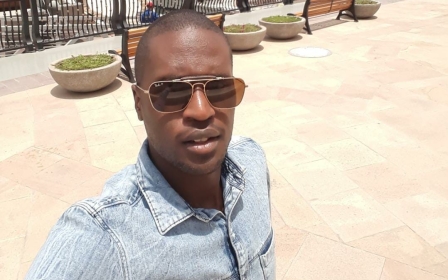Qatar: Kenyan rights activist forced to pay thousands in fines to leave country

Qatar forced a Kenyan rights activist to pay thousands of dollars in fines and hand over the passwords to his social media accounts before he could leave the Gulf Kingdom, according to rights groups.
Malcolm Bidali left Qatar on Tuesday after being held in solitary confinement for three weeks without charge in an undisclosed location.
A statement from a coalition of rights groups released on Thursday confirmed that Bidali was forced to pay approximately $6,800 in fines and passwords to his Instagram and Twitter accounts before he could leave Qatar.
Writing under the pen-name Noah, Bidali had written for Migrantrights.org (MR), shedding light on the restrictions and realities faced by workers in the gas-rich country as it prepares for the 2022 World Cup.
Qatar later charged Bidali with spreading "disinformation" under its controversial Cyber Crime Prevention Law, which carries a maximum sentence of three years in prison and a fine worth $137,000.
New MEE newsletter: Jerusalem Dispatch
Sign up to get the latest insights and analysis on Israel-Palestine, alongside Turkey Unpacked and other MEE newsletters
Commenting on his departure, Bidali said it was an "honour" to be counted as an activist who championed free speech in Qatar.
"I'm extremely fortunate to have gotten out (relatively) unscathed, given the selection of charges levelled against me," Bidali told rights groups.
"Outrageous charges, and an even more outrageous fine, for simply sharing our lived experiences and pointing out shortcomings of the specific entities responsible for workers' welfare, none of which translates to 'misinformation'."
Qatar did not respond to Middle East Eye's request for comment regarding the fine, but previously confirmed that Bidali had left the Gulf kingdom.
A coalition of human rights groups, including Amnesty and MR, also criticised the county for placing him in solitary confinement and forcing him to pay a "hefty fine".
The groups also criticised Qatar for not allowing Bidali to access legal counsel during his detention.
In June, a coalition of human rights groups criticised the country for placing Bidali in solitary confinement.
Bidali's mother, Maggie Turner, confirmed to MEE at the time that her son had been held in solitary confinement for 23 hours a day and was not given access to legal representation.
Mistreatment
The Kenyan first arrived in Qatar nearly three years ago, when he worked as a security guard in Doha.
Before his arrest, Bidali appeared at a video conference with other civil society and trade union groups describing the reality faced by many workers in Qatar.
Amnesty International reported in May that Bidali had received a suspicious URL on social media before his arrest that could have been used to track his whereabouts and record his IP address. The rights group, however, could not confirm if Qatari authorities had sent the suspicious link.
Human and labour rights organisations have denounced Qatar's treatment of migrant workers, especially under the controversial kafala system, which ties migrant workers to their local employers, preventing them from changing jobs without their permission.
Although Qatar largely ended the kafala system in September 2020, the country still has a poor record on workers' rights, with construction workers in particular operating in gruelling conditions and receiving low pay and wages delayed for months at a time.
In June, The Guardian reported that many migrant security guards in Qatar were being paid under £1 ($1.38) an hour.
In May, six Nordic associations wrote to Fifa President Gianni Infantino, urging him to ensure human rights are respected at "all facilities used before, during and after the World Cup".
"It is a matter of utmost importance for the football community across the globe… that the theatre of the greatest dreams in football also can be the stage of human rights, respect and anti-discrimination," the letter said.
Middle East Eye delivers independent and unrivalled coverage and analysis of the Middle East, North Africa and beyond. To learn more about republishing this content and the associated fees, please fill out this form. More about MEE can be found here.




